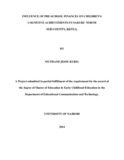| dc.description.abstract | Early Childhood Education subsector in Kenya is expanding at a tremendous rate. Various efforts by the government, communities and other collaborating partners have resulted in intersectional collaboration and a variety of education settings available to young children. Faith Based Organizations, Communities, and Public Preschools in both rural and urban settings in Kenya have increased. In order to improve Pre-school children‟s cognitive achievements, adequate funding in this subsector need to be addressed. The purpose of this study was to establish the influence of Pre-school finances on children‟s cognitive achievements in Nakuru North Sub-County. The objectives were: to establish the role of Government Finances on Pre-school children‟s cognitive achievements, to examine the role of Non-Governmental finances on Pre-school children‟s cognitive achievements and to assess the role of the community and parents finances on Pre-school children‟s cognitive achievements. Relevant literature on government‟s role and support of Early Childhood Education, support by various religious and Non-Government Organizations community and parents‟ support of Early Childhood Education and quality versus quantity of Early Childhood Education was critically reviewed. The study adopted a descriptive survey design where eight (8) headteachers, eight (8) Pre-school teachers, one (1) DICECE Programme Officer and three hundred and six (306) learners were involved in the study. Questionnaires, checklists and documentary analysis were used to collect data. Data analysis involved the use of computer excel program and descriptive statistics which were used to describe the data or the variables of the study. Frequency distribution tables were used to present the data. The findings on the influence of government finances on Pre-school children‟s cognitive achievements showed that Pre-school children in ECDE centres that were assisted with CSG scored more than 50% in all the indicators of cognitive achievements. The low scores in cognitive achievements were associated to inadequate instructional materials which are very critical in enhancing children‟s cognitive achievements. The results obtained on the influence of Non-Governmental finances on Pre-school children's cognitive achievements showed that the role of Non-Governmental finances on Pre-school children‟s cognitive achievements include, but not restricted to employing teachers and support staff. The study also noted that Non-Governmental Organizations have also played critical roles in policy development, strategic planning, high-level advocacy and capacity strengthening of ECDE centres. Cognitive achievements of Pre-school children in Faith Based ECDE centres was comparatively high compared to Public ECDE centres. This could be attributed to the additional facilities and feeding programmes available in the Faith Based ECDE centres. The findings also indicated that cognitive achievements in ECDE centres that were sponsored by the community and parents were relatively low as compared to Faith Based and Public ECDE centres. Teachers in these ECDE centres were highly demotivated due to poor remuneration which with no doubt translated to low cognitive achievements among learners. Community ECDE centres lacked feeding programmes, inadequate instructional materials, furniture, play materials, latrines and playgrounds which affected the cognitive achievements of Pre-school children in the ECDE centres. The study concluded that availability of finances is closely related to cognitive achievements of Pre-school children in ECDE centres in Nakuru North Sub-County. The researcher recommended that there is need for the government to develop a policy on budgeting allocation towards promotion of ECE Sub-sector and provide CSG to all Public ECDE Centres to improve pre-school children‟s cognitive achievements. | en_US |

